Say Goodbye to Multiple Daily Injections
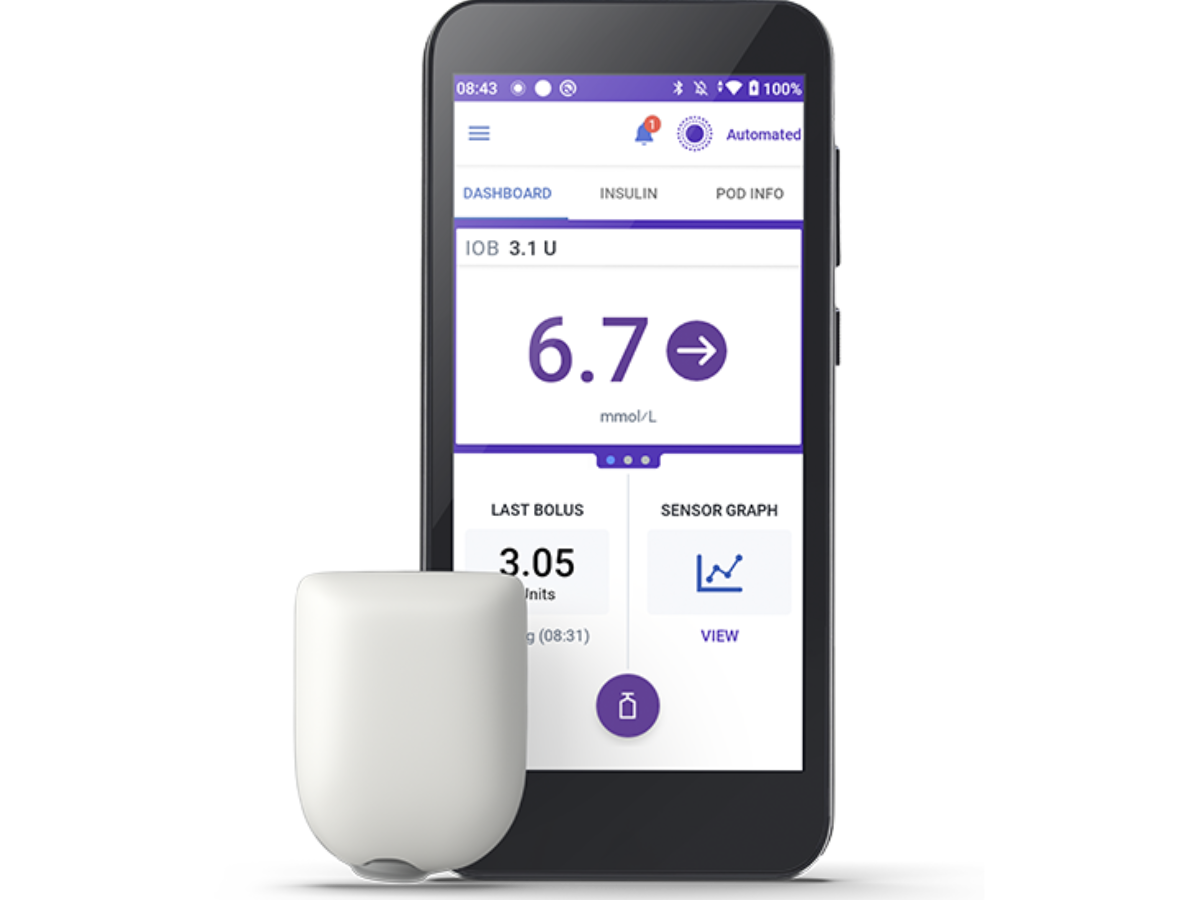

#1 Insulin Pump for New Pump Users (in Europe & US)1
Omnipod 5 proactively helps to correct highs and protect from lows–simplifying your diabetes management.2,3 No multiple daily injections or [routine] finger prick testing.‡
No More Daily Injections
Omnipod 5 delivers insulin through a discreet, on-body Pod.
Smart, Automated Insulin Delivery
Adjusts insulin every 5 minutes to help keep glucose in range.2,3
Tubeless and Discreet
No tubes, no tangling, no hassle - wear
for up to 3 days.
Improved Glucose Control
Users experience improved A1C and more time in range.2,3
How it works
Every five minutes the glucose Sensor reports glucose levels to the Pod and automatically adjusts your insulin.
• When glucose levels are dropping, insulin delivery automatically decreases or pauses.
• When glucose levels are rising, insulin delivery automatically increases.
3 simple parts. One continuous loop of communication.
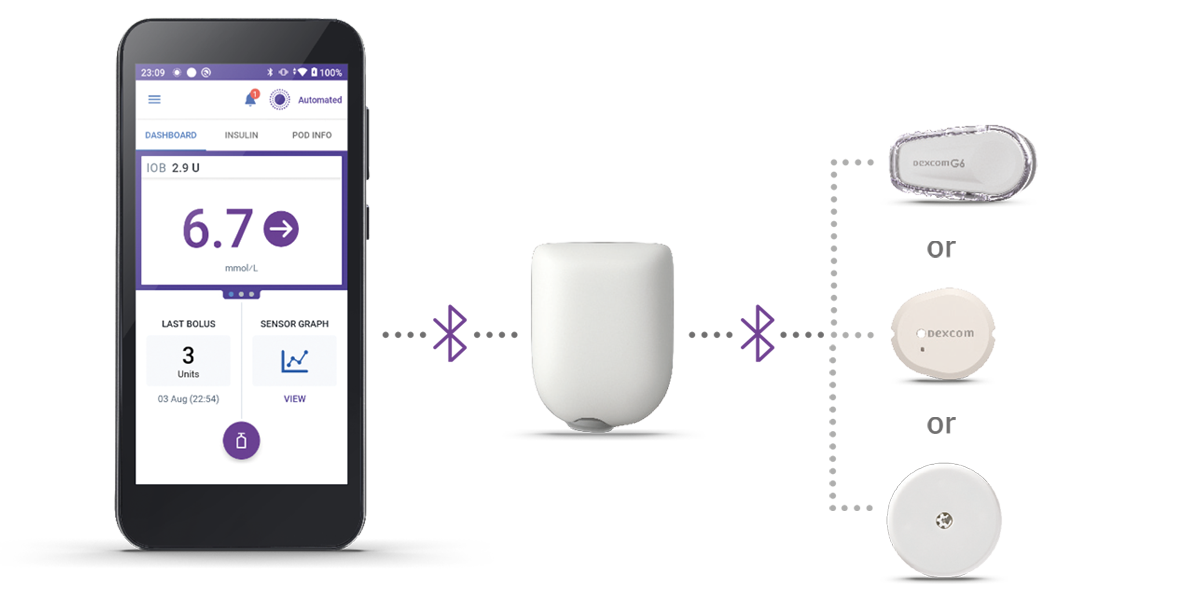

When paired with a compatible Continuous Glucose Monitor (CGM) Sensor, Omnipod 5 adjusts insulin automatically to keep you in range, day and night.2-3 Omnipod 5 is compatible with Dexcom G6, Dexcom G7, and FreeStyle Libre 2 Plus Sensor.
Hear from a Podder®:
I love that my sensor and pump are now connected with each other and that the SmartAdjust Technology enables the system to adjust my insulin needs based on my sensor data.
-Lea, Podder since 2014
Lea is a Sponsored Podder
Get to know the Omnipod 5 System
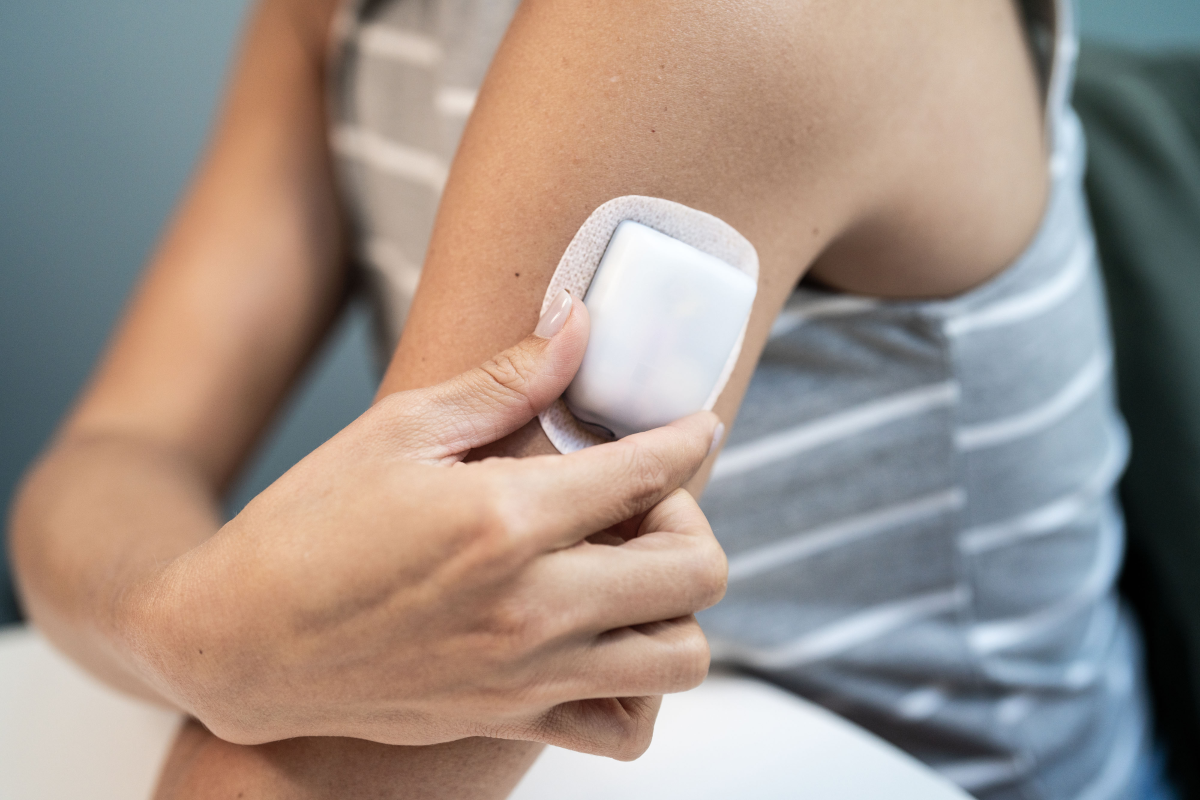

The Pod
Tubeless, wearable, and waterproof†, each Pod sits comfortably on the body for up to 3 days (72 hours), automatically adjusting insulin delivery thanks to its built-in SmartAdjust™ technology.
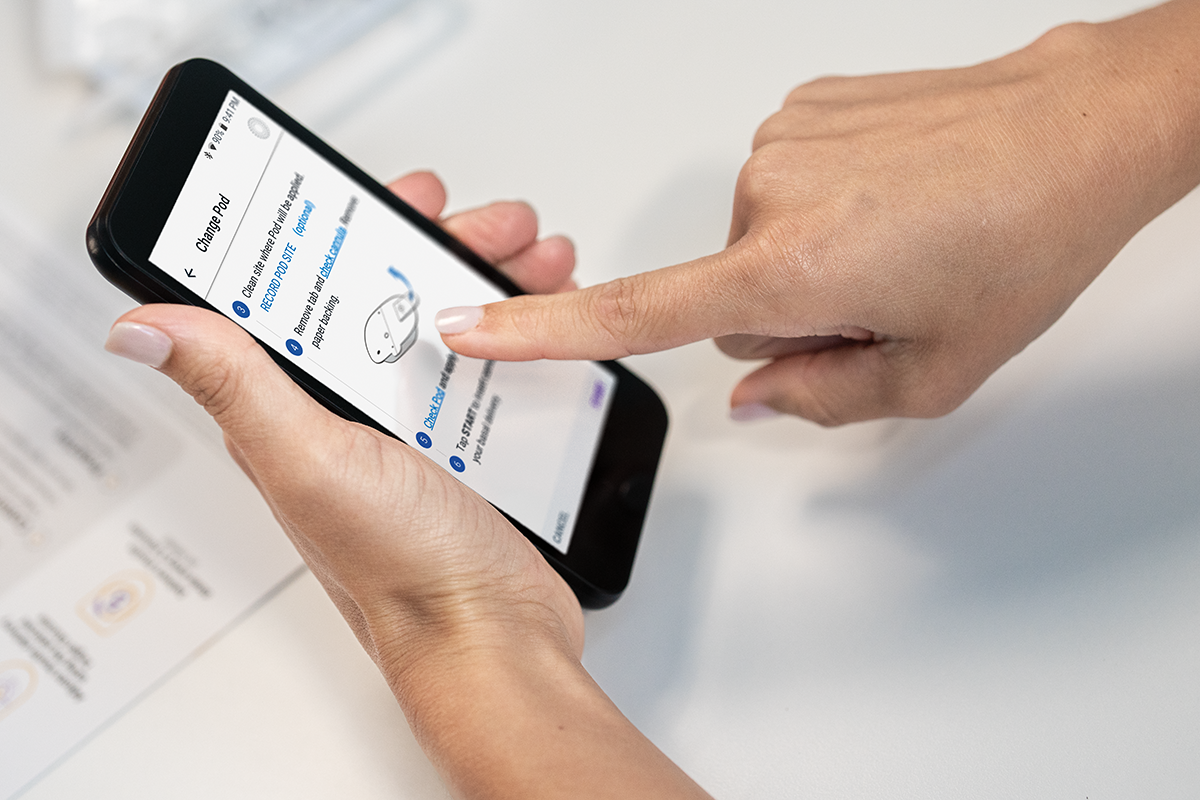

The Controller
Take charge of your diabetes with the handheld Omnipod 5 Controller, which connects seamlessly to your Pod via Bluetooth® for discreet, wireless control.
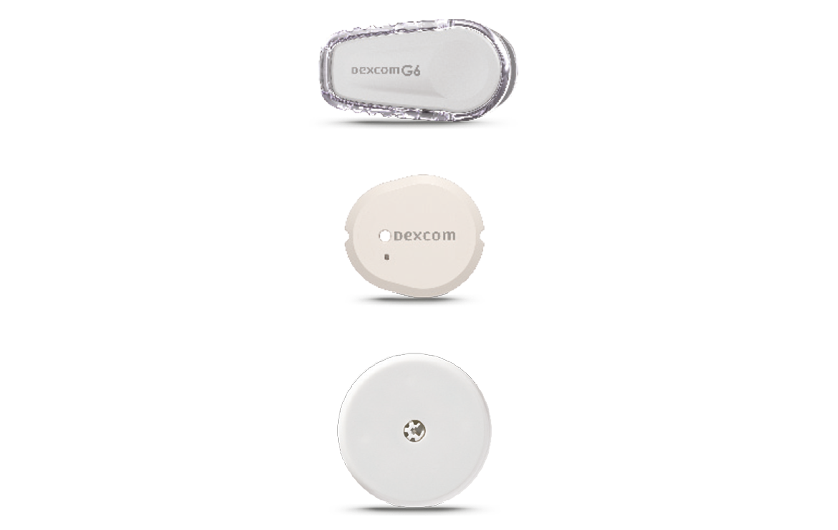

The Sensor
Your choice of compatible Sensor continuously sends glucose values to the Pod, giving you real-time readings without the hassle of finger pricks. The Pod and Sensor should be in ‘line of sight’ to stay in Automated Mode. Placing them on the same side of the body allows for best communication between the devices.
You can do anything with Omnipod 5!
For 30+ years it was insulin vials and injections; I got used to it. Now, with Omnipod 5, I have everything in the palm of my hands. Omnipod 5 has helped my A1C tremendously; my numbers stay in range more often.
-Garrett, Podder since 2024
Garrett is a Sponsored Podder


MDI vs Omnipod 5: Making the Switch Easier
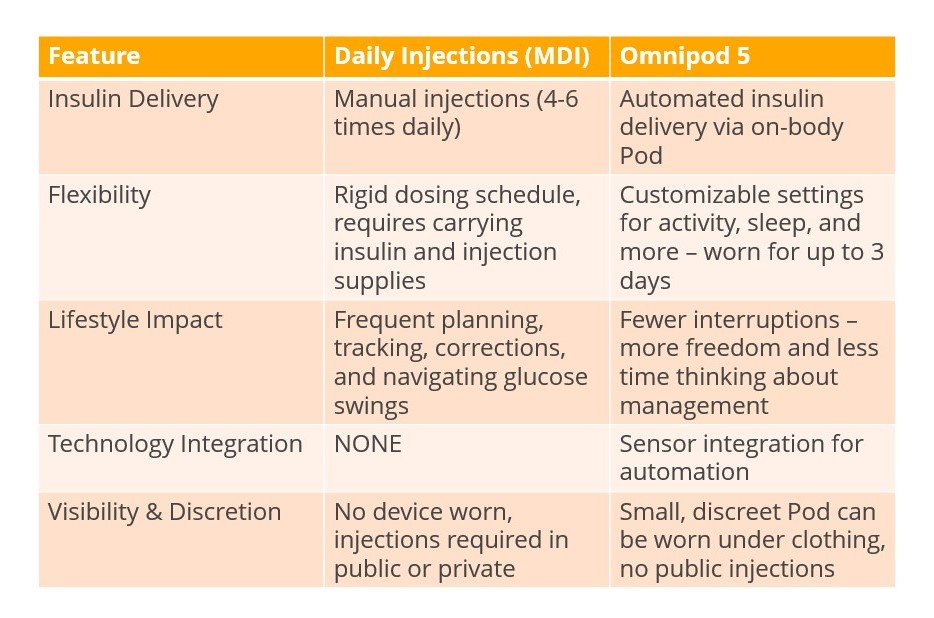

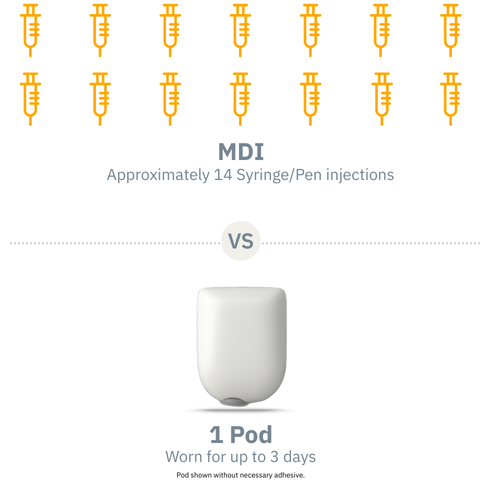

Try it for yourself
Nothing beats firsthand experience. The free Pod Experience Kit* (PEK) contains a needle-free nonfunctioning demo Pod for you to wear. It also includes a quick-start guide providing you with more information about the Omnipod® System.
Talk to an Omnipod® Specialist
Still have more questions about the Omnipod® System? Enter your information below and one of our Omnipod® Specialists will call you in 24-48 hours for a one-to-one chat. Or you can call us direct at 0800 011 6132* (option 4) or +44 20 3887 1709 (option 4) if calling from abroad.
‡Fingersticks required for diabetes treatment decisions if symptoms or expectations do not match readings.
†The Pod has an IP28 rating for up to 25 feet for 60 minutes. The Controller is not waterproof.
1. Omnipod was the most frequently chosen pump in the past year among people new to an insulin pump in survey conducted by dQ&A across Europe (n=3646), the United States (n=6,148) H2/Q4 2024 - dQ&A H2 2024 Diabetes Patient Voice EU p. 61, dQ&A Q4 2024 Diabetes Patient Voice US p. 44
2. Brown S. et al. Diabetes Care. 2021;44:1630-1640. Prospective pivotal trial in 240 participants with T1D aged 6 - 70 yrs. Study included a 14-day standard therapy (ST) phase followed by a 3-month Omnipod 5 hybrid closed-loop (HCL) phase. Mean time in range (3.9-10.0 mmol/L or 70-180mg/dL) in adults/adolescents and children as measured by CGM: ST = 64.7%, 3-mo Omnipod 5 = 73.9%, P<0.0001; ST = 52.5%, 3-mo Omnipod 5 = 68.0%, P<0.0001 respectively. Mean HbA1c: ST vs. Omnipod 5 use in adults/adolescents (14-70 yrs) and children (6-13.9 yrs), respectively (7.16% vs 6.78% or 55 mmol/mol vs. 51 mmol/mol, P<0.0001; 7.67% vs 6.99% or 60mmol/mol vs 53 mmol/mol), P<0.0001). Mean time in hyperglycaemic range (>10.0 mmol/L or >180mg/dL) as measured by CGM in adults/adolescents and children ST vs. 3-mo Omnipod 5: 28.9% vs. 22.8%; 44.8% vs 29.7%, P<0.0001, respectively. Mean time in hypoglycaemic range in adults/adolescents and children (<3.9 mmol/L or <70mg/dL as measured by CGM) as measured by CGM: ST = 1.89%, 3-mo Omnipod 5 = 1.32%, P<0.0001; ST = 2.21%, 3-mo Omnipod 5 = 1.78%, P<0.0456 respectively.
3. Sherr J. et al. Diabetes Care. 2022; 45:1907-1910. Single-arm multicenter clinical trial in 80 pre-school children (aged 2-5.9 yrs) with T1D. Study included a 14-day standard therapy (ST) phase followed by a 3-month AID phase with Omnipod 5system. Mean HbA1c as measured in very young children, ST vs. Omnipod 5 use:7.4% vs 6.9% or 57 mmol/ml vs. 53 mmol/mol; (P<0.0001). Mean time in range (3.9-10.0 mmol/L or 70-180mg/dL) as measured by CGM in children ST vs. 3-mo Omnipod 5: 57.2% vs 68.1%, P<0.0001. Mean time in hyperglycaemic range (>10.0 mmol/L or >180mg/dL) as measured by CGM in children ST vs. 3-mo Omnipod 5: 39.4% vs. 29.5%, P<0.0001, respectively. Mean time in hypoglycaemic range (<3.9mmol/L or <70mg/dL as measured by CGM) ST = 3.43% vs Omnipod 5: 2.46%, P<0.0001.
Risk Statement
The Omnipod 5 Automated Insulin Delivery System is a single hormone insulin delivery system intended to deliver U-100 insulin subcutaneously for the management of type 1 diabetes in persons aged 2 and older requiring insulin.
The Omnipod 5 System is intended to operate as an automated insulin delivery system when used with compatible Continuous Glucose Monitors (CGM). When in automated mode, the Omnipod 5 system is designed to assist people with type 1 diabetes in achieving glycaemic targets set by their healthcare providers. It is intended to modulate (increase, decrease or pause) insulin delivery to operate within predefined threshold values using current and predicted CGM values to maintain blood glucose at variable target glucose levels, thereby reducing glucose variability. This reduction in variability is intended to lead to a reduction in the frequency, severity, and duration of both hyperglycaemia and hypoglycaemia.
The Omnipod 5 System can also operate in a manual mode that delivers insulin at set or manually adjusted rates.
The Omnipod 5 System is intended for single patient use. The Omnipod 5 System is indicated for use with NovoLog®/NovoRapid®, Humalog® / Liprolog®, Admelog® / Insulin lispro Sanofi®, Trurapi® / Insulin aspart Sanofi®, and Kirsty® U-100 insulin.
WARNING: SmartAdjust™ technology should NOT be used by anyone under the age of 2 years old. SmartAdjust™ technology should also NOT be used in people who require less than 5 units of insulin per day as the safety of the technology has not been evaluated in this population.
The Omnipod® 5 System is NOT recommended for people who are unable to monitor glucose as recommended by their healthcare provider, are unable to maintain contact with their healthcare provider, are unable to use the Omnipod® 5 System according to instructions, are taking hydroxyurea and using a Dexcom Sensor as it could lead to falsely elevated CGM values and result in over-delivery of insulin that can lead to severe hypoglycaemia, and do NOT have adequate hearing and/or vision to allow recognition of all functions of the Omnipod® 5 System, including alerts, alarms, and reminders. Device components including the Pod, CGM transmitter, and CGM sensor must be removed before Magnetic Resonance Imaging (MRI), Computed Tomography (CT) scan, or diathermy treatment. In addition, the Controller and smartphone should be placed outside of the procedure room. Exposure to MRI, CT, or diathermy treatment can damage the components. Visit https://www.omnipod.com/en-gb/safety for additional important safety information.
WARNING: DO NOT start to use the Omnipod 5 System or change settings without adequate training and guidance from a healthcare provider. Initiating and adjusting settings incorrectly can result in over-delivery or under-delivery of insulin, which could lead to hypoglycemia or hyperglycemia.